Great Books of the World
Romance
Writing in this genre place their primary focus on the relationship and romantic love between two people, and must have an emotionally satisfying ending.
35 titles sorted by popularity
-
 Pride and Prejudice
Jane Austen
Pride and Prejudice
Jane Austen
Pride and Prejudice is a novel by Jane Austen, first published in 1813. The story follows the main character Elizabeth Bennet as she deals with issues of manners, upbringing, morality, education, and marriage in the society of the landed gentry of early 19th-century England. Elizabeth is the second of five daughters of a country gentleman living near the fictional town of Meryton in Hertfordshire, near London.
-
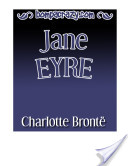 Jane Eyre
Charlotte Brontë
Jane Eyre
Charlotte Brontë
Jane Eyre is a novel by English writer Charlotte Brontë. It was published on 16 October 1847 by Smith, Elder & Co. of London, England, under the pen name "Currer Bell." The first American edition was released the following year by Harper & Brothers of New York.
-
 Sense and Sensibility
Jane Austen
Sense and Sensibility
Jane Austen
Sense and Sensibility is a novel by Jane Austen, and was her first published work when it appeared in 1811 under the pseudonym "A Lady". A work of romantic fiction, better known as a comedy of manners, Sense and Sensibility is set in southwest England between 1792 and 1797, and portrays the life and loves of the Dashwood sisters, Elinor and Marianne. The novel follows the young ladies to their new home, a meagre cottage on a distant relative's property, where they experience love, romance and heartbreak. The philosophical resolution of the novel is ambiguous: the reader must decide whether sense and sensibility have truly merged.
-
 Persuasion
Jane Austen
Persuasion
Jane Austen
Persuasion is Jane Austen's last completed novel. She began it soon after she had finished Emma, completing it in August 1816. She died, aged 41, in 1817; Persuasion was published in December that year .
-
 Emma
Jane Austen
Emma
Jane Austen
Emma, by Jane Austen, is a novel about youthful hubris and the perils of misconstrued romance. The novel was first published in December 1815. As in her other novels, Austen explores the concerns and difficulties of genteel women living in Georgian-Regency England; she also creates a lively comedy of manners among her characters.
-
 Anna Karenina
Leo Tolstoy
Anna Karenina
Leo Tolstoy
Anna Karenina is a novel by the Russian writer Leo Tolstoy, published in serial installments from 1873 to 1877 in the periodical The Russian Messenger. Tolstoy clashed with editor Mikhail Katkov over political issues that arose in the final installment ; therefore, the novel's first complete appearance was in book form.
-
 Mansfield Park
Jane Austen
Mansfield Park
Jane Austen
Mansfield Park is a novel by Jane Austen, written at Chawton Cottage between February 1811 and 1813. It was published in May 1814 by Thomas Egerton, who published Jane Austen's two earlier novels, Sense and Sensibility and Pride and Prejudice. When the novel reached a second edition in 1816, its publication was taken over by John Murray, who also published its successor, Emma.
-
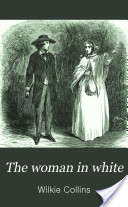 The Woman in White
Wilkie Collins
The Woman in White
Wilkie Collins
The Woman in White is Wilkie Collins' fifth published novel, written in 1859. It is considered to be among the first mystery novels and is widely regarded as one of the first in the genre of "sensation novels".
-
 Northanger Abbey
Jane Austen
Northanger Abbey
Jane Austen
Northanger Abbey /ˈnɔrθˌæŋɡər/ was the first of Jane Austen's novels to be completed for publication, though she had previously made a start on Sense and Sensibility and Pride and Prejudice. According to Cassandra Austen's Memorandum, Susan was written circa 1798–99. It was revised by Austen for the press in 1803, and sold in the same year for £10 to a London bookseller, Crosby & Co., who decided against publishing. In the spring of 1816, the bookseller was content to sell it back to the novelist's brother, Henry Austen, for the exact sum—£10—that he had paid for it at the beginning, not knowing that the writer was by then the author of four popular novels.
-
 The Age of Innocence
Edith Wharton
The Age of Innocence
Edith Wharton
The Age of Innocence is Edith Wharton's 12th novel, initially serialized in four parts in the Pictorial Review magazine in 1920, and later released by D. Appleton and Company as a book in New York and in London. It won the 1921 Pulitzer Prize for Fiction, making it the first novel written by a woman to win the Pulitzer Prize for Fiction, and making Wharton the first woman to win a Pulitzer Prize for Fiction. The story is set in upper-class New York City in the 1870s.
-
 Middlemarch
George Eliot
Middlemarch
George Eliot
Middlemarch: A Study of Provincial Life is a novel by George Eliot, the pen name of Mary Anne Evans, later Marian Evans. It is her seventh novel, begun in 1869 and then put aside during the final illness of Thornton Lewes, the son of her companion George Henry Lewes. During the following year Eliot resumed work, fusing together several stories into a coherent whole, and during 1871–72 the novel appeared in serial form. The first one-volume edition was published in 1874, and attracted large sales.
-
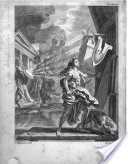 Don Quixote
Miguel de Cervantes Saavedra
Don Quixote
Miguel de Cervantes Saavedra
Don Quixote ), fully titled The Ingenious Gentleman Don Quixote of La Mancha , is a Spanish novel by Miguel de Cervantes Saavedra. It follows the adventures of Alonso Quijano, an hidalgo who reads so many chivalric novels that he decides to set out to revive chivalry, under the name Don Quixote. He recruits a simple farmer, Sancho Panza, as his squire, who often employs a unique, earthly wit in dealing with Don Quixote's rhetorical orations on antiquated knighthood. Don Quixote is met by the world as it is, initiating such themes as intertextuality, realism, metatheatre, and literary representation.
-
 The Man in the Iron Mask
Alexandre Dumas
The Man in the Iron Mask
Alexandre Dumas
The Man in the Iron Mask is a name given to a prisoner arrested as Eustache Dauger in 1669 or 1670, and held in a number of jails, including the Bastille and the Fortress of Pignerol . He was held in the custody of the same jailer, Bénigne Dauvergne de Saint-Mars, for a period of 34 years. He died on 19 November 1703 under the name of Marchioly, during the reign of Louis XIV of France . The possible identity of this man has been thoroughly discussed and has been the subject of many books, because no one ever saw his face, which was hidden by a mask of black velvet cloth.
-
 Wives and Daughters
Elizabeth Cleghorn Gaskell
Wives and Daughters
Elizabeth Cleghorn Gaskell
Wives and Daughters is a novel by Elizabeth Gaskell, first published in the Cornhill Magazine as a serial from August 1864 to January 1866. When Mrs Gaskell died suddenly in 1865, it was not quite complete, and the last section was written by Frederick Greenwood.
-
 A Connecticut Yankee in King Arthur's Court
Mark Twain
A Connecticut Yankee in King Arthur's Court
Mark Twain
A Connecticut Yankee in King Arthur's Court is an 1889 novel by American humorist and writer Mark Twain. The book was originally titled A Yankee in King Arthur's Court. Some early editions are titled A Yankee at the Court of King Arthur.
-
 Little Dorrit
Charles Dickens
Little Dorrit
Charles Dickens
Little Dorrit is a serial novel by Charles Dickens published originally between 1855 and 1857. It is a work of satire on the shortcomings of the government and society of the period. Much of Dickens' ire is focused upon the institutions of debtors' prisons—in which people who owed money were imprisoned, unable to work, until they have repaid their debts. The representative prison in this case is the Marshalsea where the author's own father had been imprisoned. Most of Dickens' other critiques in this particular novel concern the social safety net: industry and the treatment and safety of workers; the bureaucracy of the British Treasury ; and the separation of people based on the lack of interaction between the classes.
-
 Daddy-Long-Legs
Jean Webster
Daddy-Long-Legs
Jean Webster
Daddy Long-Legs is a 1912 epistolary novel by the American writer Jean Webster. It follows the protagonist, a young girl named Jerusha "Judy" Abbott, through her college years. She writes the letters to her benefactor, a rich man whom she has never seen.
-
 Anthem
Ayn Rand
Anthem
Ayn Rand
Anthem is a dystopian fiction novella by Ayn Rand, written in 1937 and first published in 1938 in England. It takes place at some unspecified future date when mankind has entered another dark age characterized by irrationality, collectivism, and socialistic thinking and economics. Technological advancement is now carefully planned and the concept of individuality has been eliminated .
-
 Our Mutual Friend
Charles Dickens
Our Mutual Friend
Charles Dickens
-
 The Portrait of a Lady
Henry James
The Portrait of a Lady
Henry James
The Portrait of a Lady is a novel by Henry James, first published as a serial in The Atlantic Monthly and Macmillan's Magazine in 1880–81 and then as a book in 1881. It is one of James's most popular long novels, and is regarded by critics as one of his finest.
-
 Le Mort d'Arthur: Volume 1
Sir Malory, Thomas
Le Mort d'Arthur: Volume 1
Sir Malory, Thomas
Le Morte d'Arthur is a compilation by Sir Thomas Malory of Romance tales about the legendary King Arthur, Guinevere, Lancelot, and the Knights of the Round Table. Malory interprets existing French and English stories about these figures and adds original material . First published in 1485 by William Caxton, Le Morte d'Arthur is today perhaps the best-known work of Arthurian literature in English. Many modern Arthurian writers have used Malory as their principal source, including T. H. White in his popular The Once and Future King and Tennyson in The Idylls of the King.
-
 Jude the Obscure
Thomas Hardy
Jude the Obscure
Thomas Hardy
Jude the Obscure, the last of Thomas Hardy's novels, began as a magazine serial and was first published in book form in 1895. Its hero, Jude Fawley, is a working-class young man who dreams of becoming a scholar. The other main character is his cousin, Sue Bridehead, who is also his central love interest. The themes in the novel revolve around issues of class, education, religion and marriage.
-
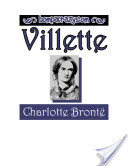 Villette
Charlotte Brontë
Villette
Charlotte Brontë
Villette /viːˈlɛt/ is a novel by Charlotte Brontë, published in 1853. After an unspecified family disaster, protagonist Lucy Snowe travels to the fictional city of Villette to teach at an all-girls school where she is unwillingly pulled into both adventure and romance. The novel is celebrated not so much for its plot as its acute tracing of Lucy's psychology, particularly Brontë's use of Gothic doubling to represent externally what her protagonist is suffering internally.
-
 This Side of Paradise
F. Scott Fitzgerald
This Side of Paradise
F. Scott Fitzgerald
This Side of Paradise is the debut novel of F. Scott Fitzgerald. Published in 1920, and taking its title from a line of the Rupert Brooke poem Tiare Tahiti, the book examines the lives and morality of post-World War I youth. Its protagonist, Amory Blaine, is an attractive Princeton University student who dabbles in literature. The novel explores the theme of love warped by greed and status-seeking.
-
 The Return of the Native
Thomas Hardy
The Return of the Native
Thomas Hardy
The Return of the Native is Thomas Hardy's sixth published novel. It first appeared in the magazine Belgravia, a publication known for its sensationalism, and was presented in twelve monthly instalments from January to December 1878. Because of the novel's controversial themes, Hardy had some difficulty finding a publisher; reviews, however, though somewhat mixed, were generally positive. In the twentieth century, The Return of the Native became one of Hardy's most popular novels.
-
 The Sorrows of Young Werther
Johann Wolfgang von Goethe
The Sorrows of Young Werther
Johann Wolfgang von Goethe
The Sorrows of Young Werther is an epistolary and loosely autobiographical novel by Johann Wolfgang von Goethe, first published in 1774; a revised edition of the novel was published in 1787. Werther was an important novel of the Sturm und Drang period in German literature, and influenced the later Romantic literary movement.
-
 Women in Love
D. H. Lawrence
Women in Love
D. H. Lawrence
Women in Love is a novel by British author D. H. Lawrence published in 1920. It is a sequel to his earlier novel The Rainbow , and follows the continuing loves and lives of the Brangwen sisters, Gudrun and Ursula. Gudrun Brangwen, an artist, pursues a destructive relationship with Gerald Crich, an industrialist. Lawrence contrasts this pair with the love that develops between Ursula and Rupert Birkin, an alienated intellectual who articulates many opinions associated with the author. The emotional relationships thus established are given further depth and tension by an intense psychological and physical attraction between Gerald and Rupert. The novel ranges over the whole of British society before the time of the First World War and eventually ends high up in the snows of the Tyrolean Alps.
-
 Arms and the Man
Bernard Shaw
Arms and the Man
Bernard Shaw
Arms and the Man is a comedy by George Bernard Shaw, whose title comes from the opening words of Virgil's Aeneid in Latin: Arma virumque cano .
-
 The History of Don Quixote, Volume 1, Complete
Miguel de Cervantes Saavedra
The History of Don Quixote, Volume 1, Complete
Miguel de Cervantes Saavedra
Don Quixote ), fully titled The Ingenious Gentleman Don Quixote of La Mancha , is a Spanish novel by Miguel de Cervantes Saavedra. It follows the adventures of Alonso Quijano, an hidalgo who reads so many chivalric novels that he decides to set out to revive chivalry, under the name Don Quixote. He recruits a simple farmer, Sancho Panza, as his squire, who often employs a unique, earthly wit in dealing with Don Quixote's rhetorical orations on antiquated knighthood. Don Quixote is met by the world as it is, initiating such themes as intertextuality, realism, metatheatre, and literary representation.
-
 Wuthering Heights
Emily Bront�
Wuthering Heights
Emily Bront�
Wuthering Heights is a novel by Emily Brontë, written between October 1845 and June 1846, and published in 1847 under the pseudonym Ellis Bell. It was her first and only published novel: she died aged 30 the following year. The decision to publish came after the success of her sister Charlotte's novel, Jane Eyre. After Emily's death, Charlotte edited the manuscript of Wuthering Heights, and arranged for the edited version to be published as a posthumous second edition in 1850.
-
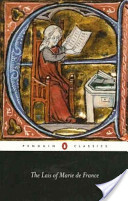 French Mediaeval Romances from the Lays of Marie de France
12th cent. Marie, de France
French Mediaeval Romances from the Lays of Marie de France
12th cent. Marie, de France
The lais of Marie de France are a series of twelve short narrative Breton lais by the poet Marie de France. They are written in the Anglo-Norman and were probably composed in the late 12th century. The short, narrative poems generally focus on glorifying the concept of courtly love through the adventures of their main characters. Despite her stature in Anglo-Norman literature and medieval French literature generally, little is known of Marie herself, though it is thought that she was born in France and wrote in England.
-
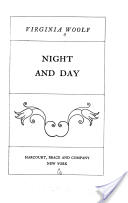 Night and Day
Virginia Woolf
Night and Day
Virginia Woolf
Night and Day is a novel by Virginia Woolf first published on 20 October 1919. Set in Edwardian London, Night and Day contrasts the daily lives and romantic attachments of two acquaintances, Katharine Hilbery and Mary Datchet. The novel examines the relationships between love, marriage, happiness, and success.
-
 The Song of Roland
Anonymous
The Song of Roland
Anonymous
This, the first great French heroic poem, is probably the earliest of the truly national poems of the modern world.
-
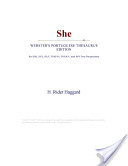 She
H. Rider Haggard
She
H. Rider Haggard
She, subtitled A History of Adventure, is a novel by Henry Rider Haggard, first serialised in The Graphic magazine from October 1886 to January 1887. She is one of the classics of imaginative literature, and as of 1965 with over 83 million copies sold in 44 different languages, one of the best-selling books of all time. Extraordinarily popular upon its release, She has never been out of print. According to the literary historian Andrew M. Stauffer, "She has always been Rider Haggard's most popular and influential novel, challenged only by King Solomon's Mines in this regard".
-
 The Princess of Cleves
Madame de La Fayette
The Princess of Cleves
Madame de La Fayette
A seventeenth century French novel tells the story of the Duc de Nemours, who fell in love with the beautiful wife of his friend, the Prince of Cleves